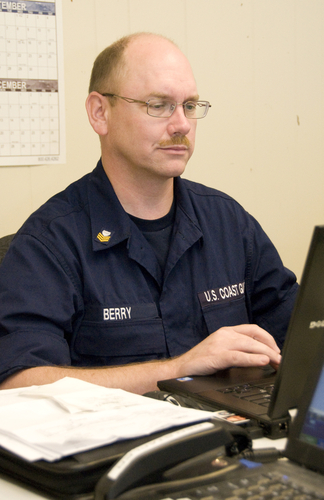Ask a Responder: Q&A with a Coast Guard Information Technology Support Technician
Petty Officer 1st Class Gregory Berry, a nine year veteran of the Air National Guard and 17-year veteran of the Coast Guard Reserve, is serving a 60-day mobilization in the Deepwater Horizon Response’s Venice Branch as an information technology support technician in the Logistics branch. Berry lives in Scarborough, Maine, with his wife Sharon, and children Stephanie and Nathaniel. Back home, he works as the network and facilities manager for a local credit union.
Q: What is your role in the response here in Venice?
A. It’s interesting, I’m a food service specialist in the Coast Guard, but I’m doing IT work here. In my civilian job I’m a network manger for a credit union, so it’s a good fit. I coordinate the transition of people in and out, to make sure they get the things they need to do their job here, like laptops, cell phones and email access.
Q: What is a typical day like for you here?
A. I arrive at the forward operating base just before 5:30 a.m. for the operations brief every morning. Shortly after that, the people transitioning out of this area process through the IT office, turning in equipment assigned to them while they were here. Then, when new arrivals are checking in, I help them get set up with email accounts, phones and laptops, if they need them.
Q: How long have you been here?
A. I mobilized for the response July 27, and I will be deployed here for 60 days. The first week was mostly training, then I began as an IT support technician. In about a week I helped 39 people get settled in to support the response and make sure they get the technical help they needed.
Q: What has been the biggest challenge for you so far?
A. One of the hardest things so far has been adjusting to being away my family, but I know they fully support me being here. When my 16-year-old son, Nathaniel, found out I was coming here, he posted, “My dad is going to the gulf to help clean up the oil spill,” on Facebook. One of his friends commented, “That’s too bad,” but he replied, “No, it’s good that he is able to go help out.” So, he turned it into a good thing.
Q: What has been your most memorable moment since arriving in Venice?
A. I was part of the core command team for the relocation during a tropical depression that passed through Venice last week. I created an inventory procedure to account for the 48 laptops and four printers we have here, and take them to a safe haven for the storm. The bulk of the people here went to New Orleans to avoid the storm, but the command team stayed closer. Then, when the storms were over, we were the first to return to Venice to get everything set up quickly for the people returning to the base, so work could resume as quickly as possible.
Q: What does it mean to you to be part of this response?
A. Part of the reason that I transitioned from the Air National Guard to the Coast Guard Reserve was because I wanted to be actively involved in marine coastal outreach. I’m glad I can take the skills I have and come down here and contribute value to the operation.
Interview by Petty Officer 3rd Class Henry G. Dunphy, a public affairs specialist assigned to the Deepwater Horizon Response Venice Branch Joint Information Center.
| Share |

